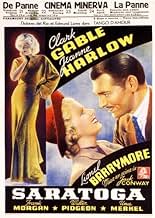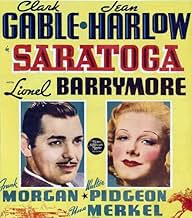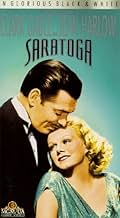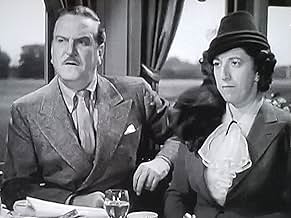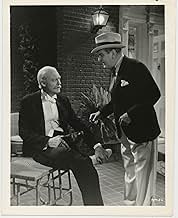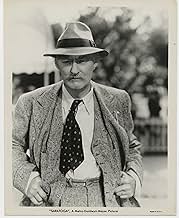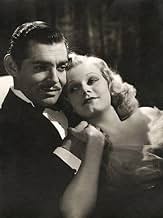AVALIAÇÃO DA IMDb
6,5/10
2,1 mil
SUA AVALIAÇÃO
Adicionar um enredo no seu idiomaAfter winning a stud farm in lieu of gambling debts, bookie Duke Bradley turns an eye to the daughter of the now deceased gambler and her millionaire fiancée.After winning a stud farm in lieu of gambling debts, bookie Duke Bradley turns an eye to the daughter of the now deceased gambler and her millionaire fiancée.After winning a stud farm in lieu of gambling debts, bookie Duke Bradley turns an eye to the daughter of the now deceased gambler and her millionaire fiancée.
- Direção
- Roteiristas
- Artistas
- Prêmios
- 3 vitórias no total
Hattie McDaniel
- Rosetta
- (as Hattie McDaniels)
Pat West
- Horse Owner
- (cenas deletadas)
Jann Andrews
- One of the Hurley Twins
- (não creditado)
Kathleen Andrews
- One of the Hurley Twins
- (não creditado)
Sheila Andrews
- One of the Hurley Twins
- (não creditado)
Franklyn Ardell
- Passenger on Train
- (não creditado)
Herbert Ashley
- Bartender
- (não creditado)
Avaliações em destaque
Taken as a diverting bit of fluff, "Saratoga" is a pleasant film not worthy of the talents of its cast but easy on the eyes. The plot is in the screwball vein but lacking the manic intensity of the genre; it revolves around a bookie trying to save a horse farm by luring a rich "chump" to lose racing bets & finance the endeavor. Clark Gable, looking alarmingly thin, is the bookie and he delivers his standard performance. Scenery-chewing Lionel Barrymore and blustering Frank Morgan are on hand playing characters they perfected during their careers. Also on board are Una Merkel, Walter Pidgeon, and in a bit role Dennis O'Keefe. Unfortunately all of this is secondary to the only reason this film merits attention: it is the final film of legendary Jean Harlow.
The tragedy of Miss Harlow has been well documented. She was literally dying while shooting this movie and it is a difficult film to sit through knowing this. In the final 20-25 minutes her character is clearly played by a double hidden behind binoculars, a large hat, or shot from behind. Nobody wanted to finish the movie after Miss Harlow passed away but there was such an outcry from her fans that the picture was completed by a heavy- hearted studio. Ironically it was her biggest hit film largely because everyone wanted to get a final glimpse of her. Her performance is not one of her best; she is lacking her usual energy & effervescence. But it is an incredibly poignant performance knowing the terrible physical pain she must have been suffering during the shoot.
By all accounts Jean Harlow was an amazing individual; beloved by all and someone who valued the happiness of others over her own. She was more concerned about letting the cast & crew of "Saratoga" down than getting help for her illness. A class act to the end.
The tragedy of Miss Harlow has been well documented. She was literally dying while shooting this movie and it is a difficult film to sit through knowing this. In the final 20-25 minutes her character is clearly played by a double hidden behind binoculars, a large hat, or shot from behind. Nobody wanted to finish the movie after Miss Harlow passed away but there was such an outcry from her fans that the picture was completed by a heavy- hearted studio. Ironically it was her biggest hit film largely because everyone wanted to get a final glimpse of her. Her performance is not one of her best; she is lacking her usual energy & effervescence. But it is an incredibly poignant performance knowing the terrible physical pain she must have been suffering during the shoot.
By all accounts Jean Harlow was an amazing individual; beloved by all and someone who valued the happiness of others over her own. She was more concerned about letting the cast & crew of "Saratoga" down than getting help for her illness. A class act to the end.
'Saratoga' was Jean Harlow's last picture, and indeed suffered from a large amount of patching-up after her death mid-way through shooting (notice the scenes where her character is only present with her back to the camera, or is missing altogether). This serves to distract the viewer from the good points of her last movie (especially the scene where Harlow has to explain away the presence of a large cigar in her room; Gable of course hiding under the bed!). In the scenes which she did manage to shoot she is fabulous, although clearly not looking her best.
Jean Harlow was probably the best sexy blonde comedienne of Hollywood's Golden Age, as testified by her marvellous work in Dinner at Eight, Libeled Lady, Riff Raff, and Bombshell. She lit up any scene she was in, and this movie is no exception. We can at least be grateful it wasn't ditched or recast, and that we have the snippets of her greatness within this fairly good movie.
Jean Harlow was probably the best sexy blonde comedienne of Hollywood's Golden Age, as testified by her marvellous work in Dinner at Eight, Libeled Lady, Riff Raff, and Bombshell. She lit up any scene she was in, and this movie is no exception. We can at least be grateful it wasn't ditched or recast, and that we have the snippets of her greatness within this fairly good movie.
SARATOGA (Metro-Goldwyn-Mayer, 1937), directed by Jack Conway, is a lighthearted comedy with some sadness attached to it. Jean Harlow, it's leading lady, never reached the finish line for this one, having died before completion got underway. Cast for the sixth and final time opposite Clark Gable, this was easily their breeziest assignment together. Walter Pidgeon, making his MGM debut, rounds out the trio playing the other man competing for his girl's affections.
With full indication of a horse racing story, the film's introduction starts off with the camera capturing the full view of racing hoofs as jockeys ride up the racetrack before the rising dust covers the screen as the credits roll to upbeat swing music of unseen vocalist belting out its title tune. Fade in begins at Saratoga's Brookvale Farm where Grandpa Clayton (Lionel Barrymore), a horse-breeder, is disappointed that his son, Fran (Jonathan Hale) has sold off his stallions to banker Ed Kenyon to cover up his financial losses. Because Clayton owes $60,000 back debt to best friend and bookmaker, Duke Bradley (Clark Gable), he offers him the mortgage deed to his property as security. Clayton's daughter, Carol (Jean Harlow), while in London, has become engaged to Hartley Madison (Walter Pidgeon), a wealthy New York stockbroker who had taken Duke for $50,000 at Belmont. While at the races, Clayton suffers a fatal heart attack shortly after Carol's return. As Carol calls for Duke to sell her back the farm, he refuses so not to foreclose on her grandfather. Intending on having Hartley give her the money to pay off Duke, Duke has other plans on getting back his losses. Regardless of trying to outbid the rich "sucker" at both auction and racetracks, Carol arranges in keeping Bradley one step ahead of Duke.
Taken from an original screenplay by Anita Loos and Robert Hopkins, the plot revolving around a snobbish girl engaged to a millionaire and becoming attracted to a smooth talking bookie was typical movie-making in the 1930s. Considering the plot being ordinary, the winning combination of Gable and Harlow makes SARATOGA all its worth. With the finished product not going according to plan due to Harlow's untimely death, how the writers managed to work around her character is more interesting than the story itself. Aside from extended use of supporting players Una Merkel (Fritzi, Duke's old flame), and Frank Morgan (Jesse Kiffmeyer, Fritzi's jealous husband allergic to horses), there's also noticeable out-takes revolving around the real Harlow and those featuring her double with face covered by large hats and camera capturing her discreetly from the back. The frequent mention of Carol's illness was certainly an excuse by not keeping her in full view. One surviving scene where Harlow's Carol, examined by Doctor Hanerstein Beard (George Zucco), constantly telling him, "I'm perfectly well. There's nothing the matter with me," comes across as too close for comfort, considering the actual circumstances of her being gravly ill during filming.
On the lighter side, Harlow demonstrates her flare for comedy in a memorable scene where she claims to have picked up cigar smoking to avoid any detection of Duke's presence in her room (who's hiding underneath her bed) from her fiancé' Bradley, after noticing the burning cigar resting on her ashtray. Gable comes across as very likable through his constant catch phrase to everyone, male or female, "I love you." When Carol uses it on Duke, he replies amusingly, "Hey, what are you trying to do, steal my gag line?" In between the battle of wits come song interludes by Walter Donaldson, Robert Wright and Chet Forrest: "Saratoga" (sung by Grace Saxon and the Four Esquires); "The Horse With the Dreamy Eyes" (sung by Cliff Edwards, Una Merkel, Clark Gable and Hattie McDaniel); "Saratoga" and reprise of "The Horse With the Dreamy Eyes." The Horse song, set on the "The Racing Special" train bound to and from Miami, is noteworthy as one of the rare cases where Gable participates in a song, and quite good at that.
Rounding out the cast of co-stars include Hattie McDaniel as Rosetta Washington, Harlow's maid; Cliff Edwards as "Tip" O'Brien; Frankie Darro the jockey, Dixie Gordon; and Margaret Hamilton appearing as the homely woman on the train seated next to Jesse (Morgan), founder of Harriet Hale Beauty Cream. Lionel Barrymore, a reliable actor, is nearly unrecognizable with his Claude Gillingwater Sr.-type performance playing the aging grandpa sporting silver hair and droopy mustache.
Regardless of title, not every scene takes place in Saratoga, but at Tropical Park in Miami, Florida, and at Churchill Downs in Louisville, Kentucky. Highlighting with a horse race sequence between Moonray and Dubonnet leading to a photo finish, SARATOGA concludes with its own photo finish with that of Jean Harlow (1911-1937) in a fond farewell to her work. To echo those words of Gable's Duke Bradley, fans would gladly say, "Jean, we love you." Formerly available on video cassette in the 1990s, SARATOGA is certainly a sure bet whenever presented on Turner Classic Movies. (*** markers)
With full indication of a horse racing story, the film's introduction starts off with the camera capturing the full view of racing hoofs as jockeys ride up the racetrack before the rising dust covers the screen as the credits roll to upbeat swing music of unseen vocalist belting out its title tune. Fade in begins at Saratoga's Brookvale Farm where Grandpa Clayton (Lionel Barrymore), a horse-breeder, is disappointed that his son, Fran (Jonathan Hale) has sold off his stallions to banker Ed Kenyon to cover up his financial losses. Because Clayton owes $60,000 back debt to best friend and bookmaker, Duke Bradley (Clark Gable), he offers him the mortgage deed to his property as security. Clayton's daughter, Carol (Jean Harlow), while in London, has become engaged to Hartley Madison (Walter Pidgeon), a wealthy New York stockbroker who had taken Duke for $50,000 at Belmont. While at the races, Clayton suffers a fatal heart attack shortly after Carol's return. As Carol calls for Duke to sell her back the farm, he refuses so not to foreclose on her grandfather. Intending on having Hartley give her the money to pay off Duke, Duke has other plans on getting back his losses. Regardless of trying to outbid the rich "sucker" at both auction and racetracks, Carol arranges in keeping Bradley one step ahead of Duke.
Taken from an original screenplay by Anita Loos and Robert Hopkins, the plot revolving around a snobbish girl engaged to a millionaire and becoming attracted to a smooth talking bookie was typical movie-making in the 1930s. Considering the plot being ordinary, the winning combination of Gable and Harlow makes SARATOGA all its worth. With the finished product not going according to plan due to Harlow's untimely death, how the writers managed to work around her character is more interesting than the story itself. Aside from extended use of supporting players Una Merkel (Fritzi, Duke's old flame), and Frank Morgan (Jesse Kiffmeyer, Fritzi's jealous husband allergic to horses), there's also noticeable out-takes revolving around the real Harlow and those featuring her double with face covered by large hats and camera capturing her discreetly from the back. The frequent mention of Carol's illness was certainly an excuse by not keeping her in full view. One surviving scene where Harlow's Carol, examined by Doctor Hanerstein Beard (George Zucco), constantly telling him, "I'm perfectly well. There's nothing the matter with me," comes across as too close for comfort, considering the actual circumstances of her being gravly ill during filming.
On the lighter side, Harlow demonstrates her flare for comedy in a memorable scene where she claims to have picked up cigar smoking to avoid any detection of Duke's presence in her room (who's hiding underneath her bed) from her fiancé' Bradley, after noticing the burning cigar resting on her ashtray. Gable comes across as very likable through his constant catch phrase to everyone, male or female, "I love you." When Carol uses it on Duke, he replies amusingly, "Hey, what are you trying to do, steal my gag line?" In between the battle of wits come song interludes by Walter Donaldson, Robert Wright and Chet Forrest: "Saratoga" (sung by Grace Saxon and the Four Esquires); "The Horse With the Dreamy Eyes" (sung by Cliff Edwards, Una Merkel, Clark Gable and Hattie McDaniel); "Saratoga" and reprise of "The Horse With the Dreamy Eyes." The Horse song, set on the "The Racing Special" train bound to and from Miami, is noteworthy as one of the rare cases where Gable participates in a song, and quite good at that.
Rounding out the cast of co-stars include Hattie McDaniel as Rosetta Washington, Harlow's maid; Cliff Edwards as "Tip" O'Brien; Frankie Darro the jockey, Dixie Gordon; and Margaret Hamilton appearing as the homely woman on the train seated next to Jesse (Morgan), founder of Harriet Hale Beauty Cream. Lionel Barrymore, a reliable actor, is nearly unrecognizable with his Claude Gillingwater Sr.-type performance playing the aging grandpa sporting silver hair and droopy mustache.
Regardless of title, not every scene takes place in Saratoga, but at Tropical Park in Miami, Florida, and at Churchill Downs in Louisville, Kentucky. Highlighting with a horse race sequence between Moonray and Dubonnet leading to a photo finish, SARATOGA concludes with its own photo finish with that of Jean Harlow (1911-1937) in a fond farewell to her work. To echo those words of Gable's Duke Bradley, fans would gladly say, "Jean, we love you." Formerly available on video cassette in the 1990s, SARATOGA is certainly a sure bet whenever presented on Turner Classic Movies. (*** markers)
Corny? Sure. Dated? A big part of this movie's charm. Of course, the fact that this was Harlow's last movie makes it worth watching for this reason alone but the fascinating repartee between Gable and her throughout the film is hugely entertaining. For racing fans, the scenes of old Hialeah and Saratoga race tracks shows the days when having a bet on a horse race was the only legal way to gamble. In those days, next to baseball, horse racing was the most popular sport in America and the scenes of huge crowds are a testimonial to that fact. In fact, this movie is a chronicle of American sporting history and unlike the recent horse racing films, "Seabiscuit" and "Secretariat", it is able to show the real glory of horse racing and the elite who were able to own and breed these most noble of animals.
Jean Harlow and Clark Gable teamed up for the last time in this light film, "Saratoga," about a young woman, her wealthy fiancée (Walter Pidgeon), and the horse breeding farm deeded to a bookie (Gable) to pay off a gambling debt. Harlow wants to handicap horses and lay bets to pay off the marker, and Gable wants to take her boyfriend on a long ride to poverty by taking his bets.
I can't imagine how disheartening it was for the actors, director, and crew to have to finish the film after Jean Harlow's untimely death. Unfortunately, the film for viewers soon becomes how they camouflaged the fact that her stand-in and a vocal imitator completed the picture. Most disconcerting is a large party scene, where the internal sections feature the stand-in, and the external ones on the terrace are with Harlow. All of the race track scenes were obviously done last, with the stand-in hiding her face with binoculars. And there is one scene where she is completely covered with a picture hat. The character's only appearances at the end of the film are at the race track and, back turned, in the race track office. The ending shot is actually from an earlier scene, or it was done at the same time the earlier scene was filmed.
Despite being ill during the production, Harlow is wonderful in her final role and she and Gable have excellent chemistry. She truly was one of the great screen presences, just delightful in every way. Walter Pidgeon is young and handsome, and despite having to say "I love ya" dozens of times, Gable is likable, relaxed, and handsome. It just all seems very disjointed. And very sad.
I can't imagine how disheartening it was for the actors, director, and crew to have to finish the film after Jean Harlow's untimely death. Unfortunately, the film for viewers soon becomes how they camouflaged the fact that her stand-in and a vocal imitator completed the picture. Most disconcerting is a large party scene, where the internal sections feature the stand-in, and the external ones on the terrace are with Harlow. All of the race track scenes were obviously done last, with the stand-in hiding her face with binoculars. And there is one scene where she is completely covered with a picture hat. The character's only appearances at the end of the film are at the race track and, back turned, in the race track office. The ending shot is actually from an earlier scene, or it was done at the same time the earlier scene was filmed.
Despite being ill during the production, Harlow is wonderful in her final role and she and Gable have excellent chemistry. She truly was one of the great screen presences, just delightful in every way. Walter Pidgeon is young and handsome, and despite having to say "I love ya" dozens of times, Gable is likable, relaxed, and handsome. It just all seems very disjointed. And very sad.
Você sabia?
- CuriosidadesIn May of 1937, with the film about 90% completed, Jean Harlow collapsed on the set and died about a week later, reportedly of uremic poisoning. Her remaining scenes were shot with double Mary Dees being filmed only from behind. Paula Winslowe supplied the voice.
- Erros de gravaçãoIn opening credits, last name of Hattie McDaniel is listed as "McDaniels."
- Citações
Fritzi 'Muggins' Kiffmeyer: We women can do things to a man we love that men wouldn't do to a rattlesnake.
- ConexõesFeatured in MGM: When the Lion Roars: The Lion Reigns Supreme (1992)
- Trilhas sonorasSaratoga
(1937) (uncredited)
Music by Walter Donaldson
Lyrics by Bob Wright and Chet Forrest
Sung during credits by Grace Saxon and Four Esquires
Reprised by them at a party
Principais escolhas
Faça login para avaliar e ver a lista de recomendações personalizadas
- How long is Saratoga?Fornecido pela Alexa
Detalhes
Bilheteria
- Orçamento
- US$ 1.144.000 (estimativa)
- Tempo de duração
- 1 h 32 min(92 min)
- Cor
- Proporção
- 1.37 : 1
Contribua para esta página
Sugerir uma alteração ou adicionar conteúdo ausente



